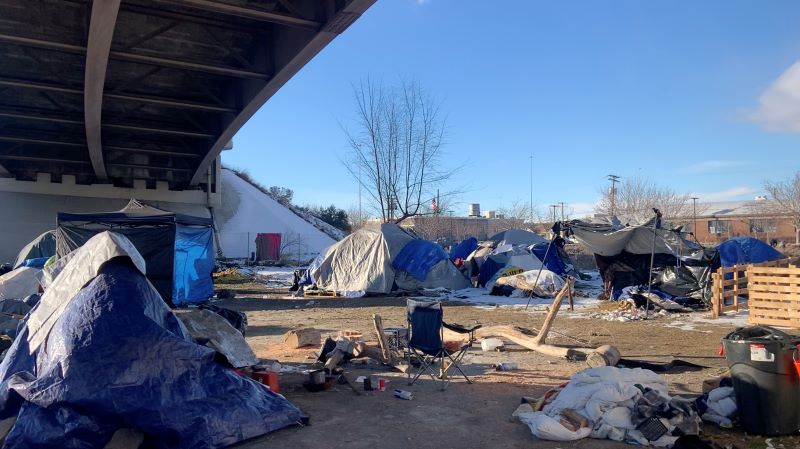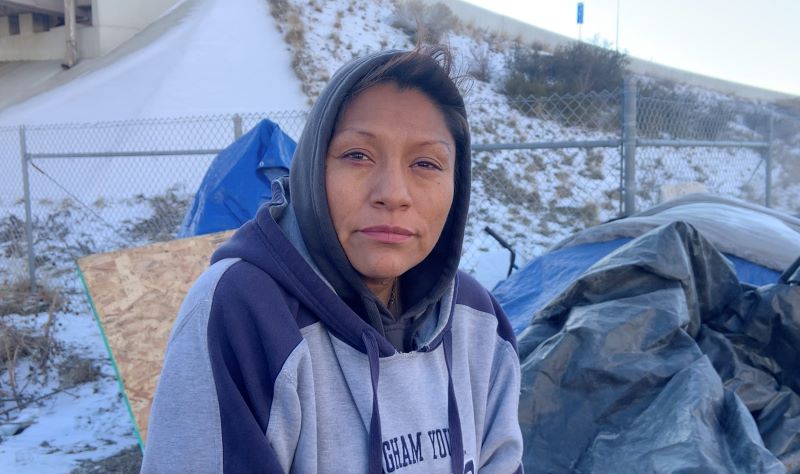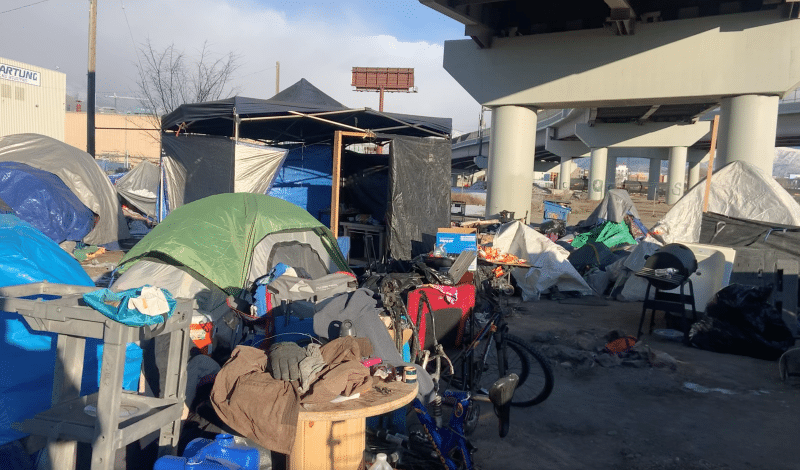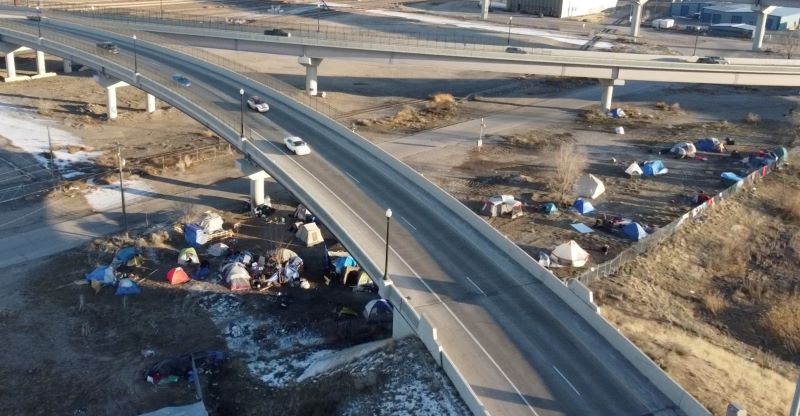
Salt Lake’s Largest Outdoor Homeless Encampment Shuttered and Abated
A mini tent city was growing under the freeway on 700 West and 500 South. This encampment appeared to be a semi-permanent solution in an effort to relocate the homeless away from Main Street and the central downtown business district. Last November We reported how business owners were experiencing serious problems with the homeless population camping on streets: coming into work finding human defecation, garbage on their sidewalks and open-air drug use in front of their businesses on Main Street in downtown Salt Lake City.
This tent community under the freeway that called itself Fort Pioneer was somewhat organized and was receiving support from homeless advocate organizations such as VOA. But two weeks ago the entire area was “abated” or removed under the no-camping ordinance that SLCPD is enforcing by the Mayor’s direction. This is one of several dozen abatements that have occurred over the past years, now costing the city and taxpayers hundreds of thousands of dollars in police overtime hours.
I visited tFort Pioneer on two occasions this past winter to interview the residents. At 2 PM on a cold January afternoon, in the frigid shadow of the freeway overpass overhead, I found tents, bags of Cheetos, bikes, and belongings. I noticed no foul odor; the grounds around the area were maintained, mostly free of garbage, and there was a sense of ownership.
One area had a fence fashioned from pallets. Another tent shanty, a supported tarp appeared to be a bike repair shop. A similar tent appeared to be a kitchen area. It seemed this camp was evolving from a tent city to a shanty town. Compared to the three previous encampments I visited, this was a big step up because it wasn’t blocking public parking, trails, or sidewalks and it was still in close proximity to homeless amenities like the Saint Vincent’s where hot meals are offered free-of-charge.
Eventually, a tall, thin young man with jet black hair emerged from a tent. After I told him I’m a reporter, seeking interviews he introduced me to his girlfriend.

Savannah is Ute from Fort Duchesne, her boyfriend is Navaho. She told me she and her boyfriend had been camping there for three months, and that a lot of the people currently living there were at work. This is another highly unusual aspect of this camp, as most of those I’ve spoken to who are living outdoors say they could never get jobs because they cannot leave their belongings. She and her boyfriend came from the Fort Duchesne reservation in Eastern Utah to settle in Salt Lake City to see if they could make a better life for their children.
“We are waiting for permanent housing.” I assume she is speaking about Utah’s Housing First Program, which I’ll return to later. She said this wait has gone on for a long time, and added, ”they lost my paperwork in 2019, so we re-submitted our paperwork in 2021. When I called they said the waiting time now is likely three to five years.” Savannah tells me that she is staying here instead of one of the shelters because she doesn’t want to split up with her boyfriend. “I don’t think that is healthy.” and adds, “We support each other.”
In the past few months, dozens of camps similar to this one have been abated, and this camp appears to have grown and developed without police presence or involvement. I ask Savannah why this camp has remained intact for so long.
“The cops don’t bother us because we aren’t violent people. Everybody here is calm and respectful…People have been surprised that we haven’t had the cops called here. We just try to keep it as clean as we can. If there is a confrontation, they handle it on their own.”
I tell Savannah that in the past five years homeless spending has increased by over $20 million. I asked her, “If you could spend $1 million in this area, what would you want?”
“I would like to open a shelter for couples, where they could also take their animals with them.”

“Or use our funding to buy land and build a real community.” It seems that community is the common thread that holds homeless encampments together. I find that the majority of those I’ve spoken with who have attempted to stay in shelters say they don’t like them because there is no sense of ownership and they are treated like “prisoners”. Two other people echoed this sentiment who I spoke to after Savannah.
Fort Pioneer had the support of several homeless organizations including Volunteers of America (VOA) who were helping everyone have enough blankets and warm clothing and sternos (which are cans with gel butane) to survive the freezing temperatures. Another organization that provided a trailer with electricity for the community to charge their phones and have Wi-Fi is called OAS. Advocates also convinced the city to provide a dumpster. Things seemed to be stable and it didn’t appear to be an open-air drug scene, like other encampments I have found.

Homeless Advocates claim SLC Mayor Mendenhall has a conflict of interest with her husband’s development project just blocks away from the former shelter.
On my second visit, I met Jen who is a homeless advocate visiting her friends at the camp. She tells me she has been working with the homeless population since 2018. At that time more of them started showing up in her neighborhood near the Salt Lake Bees ballpark when the women’s resource center opened nearby. She decided rather than get upset about it, she would talk to them. She tells me:
“[The Mayor] is more interested in representing the business owners and the developers. Her husband is a developer. There is a Utah Story for you! Her husband owns a property just a block and a half from where the former homeless shelter was bulldozed.” Jen adds, “When I found out that those were her apartments over there, it was really hard for me to believe that there wasn’t a correlation for her wanting to clean up the area because it’s lining her pockets. She likes to deflect responsibility to the state or the county.”
Mayor Mendenhall’s husband Kyle LaMalfa is building an affordable housing project on 800 West and 144 South. The project has received resistance because it is classified as a “below-market” meaning that it’s designed for affordability over aesthetics. It doesn’t appear that this project would be a conflict of interest in maintaining this camp. But it doesn’t look great that the Mayor will realize a direct benefit by keeping the west-side free of a semi-stable tent population.

The Mayor’s Let-Them-Eat-Cake attitude towards Salt Lake City’s homeless population is not viable nor is it humane.
Nobody at Fort Pioneer knew that in just two weeks everyone would be forced to leave by the police and everything and everyone would be required to move with little notice.
But why did city officials and the Mayor decide to force these people to move? There were no complaints and the police weren’t being called. Why was the camp being cleared and abated?
It could be that while this tent community wasn’t an issue for business owners or the community the Mayor has sought a ban on all zoning of any additional homeless shelters inside of city limits. Homeless advocates do not believe the treatment and the $600 thousand spent in overtime hours for police conducting homeless camp abatements is good policy and humane treatment of Utah’s unsheltered community.
City leaders are still defending their solution to the homelessness problem in their decision to demolish the former downtown Salt Lake City Road Home in 2018, which offered 1,100 beds. New accommodations since 2016 offer just 700 beds spread out over the valley in four Homeless Resource Centers. According to a recent audit, Homeless spending has increased by 600% since 2016 while the homeless population has increased by 150% since then. Today far more unsheltered people are camping on the streets than have ever been seen before, and it’s clear today that many of those who were sheltered at Fort Pioneer are now once again camping again on city streets in far less desirable areas. As mentioned earlier there is a big incentive for the homeless to remain without homes.
The Housing First Program was designed to dramatically reduce or eliminate homelessness. Nearly every chronic homeless person I’ve spoken to in the past six months is on a waiting list to receive free housing. The Magnolia Project is the latest addition to the program. Fair market rates for such housing, in the middle of downtown, would exceed $1,200 per month. Those who have been on the list long enough received this housing for free. Salt Lake City’s unsheltered community would settle for a warm tent and a place where the police won’t remove their belongings.
A recent report to the Utah State Legislature indicates that the state coffers will require an additional $500 million dollars to properly fund the Housing First program and all of those who are currently waiting on free long-term supportive housing.
Savanna and the previous family we profiled are all waiting for their housing, choosing to brave the elements and the cold rather than reside in the shelters.
RELATED CONTENT
Why Is the 600% Increase in Homeless Spending Resulting in More Homelessness in Utah?
Homeless Families Braving the Cold Rather Than Stay in Shelters in Salt Lake City
An Alternative Salt Lake Homeless Solution: Switchpoint May Be the Answer
Homeless Policies in Salt Lake City: Paying off? Or an Endless Money Pit?
Subscribe to Utah Stories weekly newsletter and get our stories directly to your inbox





